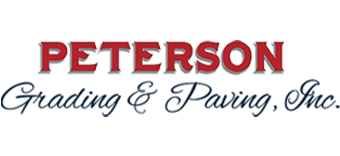Whether they are on a parking lot pavement, a busy highway, or a suburban boulevard, lines and stripes improve safety and enhance the pavement’s appearance. However, paints wear away, parking lot layouts require alterations, and traffic patterns change. The old lines need to be removed for safety or aesthetic reasons. At Peterson Grading & Paving, we are familiar with the various techniques that can be employed line removal.
Why Do the Old Lines Require Removal?
In a parking lot, painted lines seldom last more than two years or so. They lose too much visibility or suffer too much damage to serve any useful purpose. Removing the existing lines helps ensure that the new lines will be crisp and neat. The same problems can plague lines on roadways. Furthermore, all pavements may require modifications. Parking lot owners may need to change the parking angle, or they may need to modify or add spaces to comply with the ADA. On streets and highways, it may be necessary to widen traffic lanes, make changes to no-passing zones, or lengthen turn lanes.
If Existing Lines Are Not Removed, What Is the Impact?
It is virtually impossible to achieve a precise match between the old lines and the new ones. The new ones can be broader or narrower than desired, and they may not appear straight. The pavement’s appearance is affected, but the sloppy lines can also confuse drivers, especially on roadways.
Can I Paint Over My Old Lines?
If appearance does not matter, you can paint over existing lines with black paint. The results will detract from your parking lot’s curb appeal, and the black paint will not withstand a high volume of traffic on a busy street. Furthermore, unless you are planning to have additional work performed soon, you can end up spending more on repeated applications than it would cost for an effective removal procedure.
How Do You Remove Lines on Asphalt Pavements?
We are aware of numerous methods for eradicating pavement lines. Some of them provide only temporary results, others can damage asphalt, and still others require chemicals that can negatively impact the environment. We have found the following three techniques to be the safest, most cost-effective methods.
1. A scarifier is a type of grinder that can scratch or grind off the paint. They also remove a tiny layer of pavement, leaving a textured finish where the stripes had been. Scarifying is a highly effective and relatively quick way to remove existing lines, especially if the new paint will be applied in the same locations. Scarifying is typically the most economical way to remove lines from asphalt pavements.
2. Waterblasting can peel paint away by using high-pressure jets of water that do little or no damage to the asphalt pavement. Waterblasting is typically reserved for situations in which aesthetic appeal is of the utmost importance.
3. Wire brushes can be used to remove lines, but the method is very labor-intensive, and it is not all that fast. However, it can be an effective way to remove lines from a very small area, so the method can be used to supplement other removal techniques, correct a striping error, or on its own to remove just one or two short lines.
Peterson Grading & Paving is an asphalt paving contractor in the Orange County, California area. We offer line removal, sealcoating, parking lot striping, asphalt patching, parking lot maintenance, concrete ramp construction, asphalt paving, marking removal, asphalt overlays, concrete sidewalk construction, asphalt milling, parking lot signage, asphalt crack repairs, concrete parking lot construction, warehouse striping, pavement markings, ADA compliance, bollard installations, epoxy coatings, concrete curbing, and shot blasting. We are a well-respected company serving hotels, facility managers, property management firms, homeowner associations, retailers, educational facilities, condos, and churches throughout California. We are known for our craftsmanship, dependability, customer service, and professionalism. For a free quote, use the online form to send us your information. If you prefer, you can call 949-402-6979.


